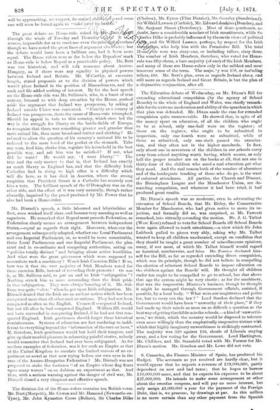Mr. Disraeli's speech, a little laboured and labyrinthine at first,
soon worked itself clear, and became very amusing as well as sagacious. He remarked that Repeal must precede Federation, as Federation clearly means an arrangement between independent States,—equal as regards their right. Moreover, whatever the arrangement subsequently adopted, whether one Local Parliament and one Imperial Parliament, or, as would be more conceivable, three Local Parliaments and one Imperial Parliament, the plan must end in co-ordinate and competing authorities, acting on "policies totally distinct" and bringing about active hostilities. And what were the great grievances which were supposed to necessitate such a machinery? Was it Irish Coercion Bills ? If so, how was it that the vast majority of Irish Members voted for these coercion Bills, instead of recording their protests ? Or was it, as Mr. Sullivan said, to put an end to Irish " subjugation "? Nothing struck him as more astounding than the Irish pride in that subjugation. They were always boasting of it. Mr. Sul- livan was quite " elate " when he got upon Irish subjugation. Mr. Disraeli denied that the Irish are an ancient nation which has been conquered more than all other ancient nations. They had not been conquered as often as the English. Cromwell conquered Ireland, but not till after he had conquered England. William III. would not have succeeded in conquering Ireland, if he had not first con- quered England. Irish gentlemen should forget these historical reminiscences. Systems of education are fast rendering us indif- ferent to everything beyond the "information of the current hour." If, therefore, Irish gentlemen would but hold their tongues, and give up their morbid pleasure in rehearsing painful stories, nobody would remember that Ireland had ever been subjugated. As for modern examples of federation, was it for such an Empire as that of the United Kingdom to emulate the limited success of an ex- periment so novel as that now trying before our own eyes in the case of the Austro-Hungarian Federation ? Mr. Disraeli was not prepared to stake the fortunes "of an Empire whose flag floats upon many waters" on so dubious an experiment as that. And thus, with a serious warning against the danger of civil war, Mr. Disraeli closed a very eloquent and effective speech.


































 Previous page
Previous page